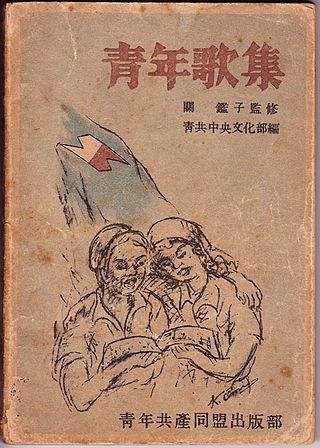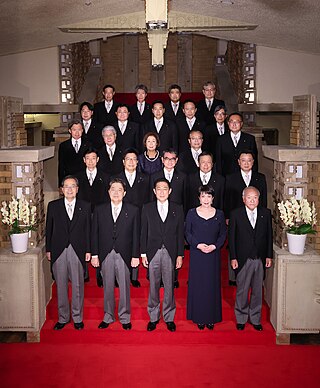Related Research Articles
Taxation in Japan is based primarily upon a national income tax (所得税) and a residential tax (住民税) based upon one's area of residence. There are consumption taxes and excise taxes at the national level, an enterprise tax and a vehicle tax at the prefectural level and a property tax at the municipal level.
Kyōiku kanji, also known as Gakunenbetsu kanji haitōhyō is a list of 1,026 kanji and associated readings developed and maintained by the Japanese Ministry of Education that prescribes which kanji, and which readings of kanji, Japanese students should learn from first grade to the sixth grade. Although the list is designed for Japanese students, it can also be used as a sequence of learning characters by non-native speakers as a means of focusing on the most commonly used kanji.

Masami Nagasawa is a Japanese actress and model. She has had a prolific film career since her teenage years and has starred in various blockbusters, receiving multiple accolades, including five Japan Academy Film Prizes and four Blue Ribbon Awards.
Michiko Evwana, better known by her stage name Minmi, is a Japanese hip-hop and reggae musician, as well as a singer-songwriter and record producer. She is the first soca artist from Japan. Since 2007, she has been married to Wakadanna (若旦那), a member of Japanese reggae group Shōnan no Kaze.

Yurihama is a town located in Tōhaku District, Tottori Prefecture, Japan. As of 31 December 2022, the town had an estimated population of 16,515 in 6452 households and a population density of 210 persons per km². The total area of the town is 77.94 square kilometres (30.09 sq mi).

Emi Suzuki, also called Emichee (えみちぃ), is a Japanese model and retired occasional actress. She debuted in 2005 with Seventeen and remains a prominent figure in the fashion and modeling industry.
The 2010 Shifnal Festival ran from Friday 17 September to Sunday 26 September 2010, and hosted a number of musical, artistic and cultural events at a number of locations around the town. The organising committee was chaired by Tony Stringfellow.
The "Truly Strong Universities" is a ranking of Japan's top 100 universities by publisher Toyo Keizai released annually in its business magazine of the same name.
The 2011 Shifnal Festival ran from Tuesday 13 September to Sunday 25 September.

Hana Sugisaki is a Japanese actress who was previously signed to Stardust Promotion. Her former stage name was Hana Kajiura.

The Singing Voice of Japan is the name of a social and political movement that emerged after World War II in Japan and based on musical and choral activities of the working class of the entire nation. On the ideological position of communism or democratic socialism, activists of the movement organize choral circles in factories, in schools and in their residential areas. The movement reached its peak in the years 1950–60. Japanese singer Akiko Seki is generally regarded as the founder of the Singing Voice of Japan.

Children of the Sea is a 2019 Japanese animated film directed by Ayumu Watanabe and produced by Eiko Tanaka, with animation production by Studio 4°C. It is based on the manga of the same title by Daisuke Igarashi, who also wrote the film's screenplay. It is Watanabe's first theatrically released film since Space Brothers #0 (2014), and the first animated film adaptation of an Igarashi manga. The film stars the voices of Mana Ashida, Hiiro Ishibashi and Seishū Uragami. Set by and in the ocean and themed on the mysteries of life, it depicts the connections between humanity and nature. It was released in Japan on June 7, 2019.
The 10 sen note (十銭紙幣) was a denomination of Japanese yen issued in four different series from 1872 to 1947 for use in commerce. Meiji Tsūhō notes are the first modern banknotes issued after Japanese officials studied western culture. There circulated alongside ten sen coins until their withdrawal in 1887. The other three series of ten sen notes issued are in some way tied to the impacts of World War I and World War II. Taishō fractional ten sen notes were issued as a response to a coin shortage that was caused by the first of these wars. They were eventually suspended in the early 1920s when things had settled down, and were later demonetized in 1948. The last two series of ten sen notes were issued by the Bank of Japan rather than the treasury. First series notes were issued as ten sen coins could no longer be produced, while the A series was released after the war in a futile attempt to curb inflation. These last two issues were demonetized at the end of 1953 when the Japanese government passed a law abolishing subsidiary notes in favor of the yen. Ten sen notes are now bought and sold as collectors items depending on condition.
The 20 sen note (二十銭紙幣) was a denomination of Japanese yen in three different government issued series from 1872 to 1919 for use in commerce. Meiji Tsūhō notes are the first modern banknotes issued after Japanese officials studied western culture. These notes were replaced due to counterfeting by a redesigned series called "Ōkura-kyō" for "sen" denominations. Both of these series were officially abolished in 1899 in favor of notes issued by the Bank of Japan. Government issued notes only returned during the Taishō era in the form of an emergency issue due to a coin shortage. These were only issued between 1917 and 1919 before they were finally abolished in 1948. Twenty sen notes are now bought and sold as collectors items depending on condition.
The 50 sen note (五十銭紙幣) was a denomination of Japanese yen in six different government issued series from 1872 to 1948 for use in commerce. Those in the "Meiji Tsūhō" series are the first modern banknotes issued after Japanese officials studied western culture. Counterfeiting eventually became an issue which led to the issuance of "Ōkura-kyō" notes in 1882. These were issued as part of a larger series featuring Empress Jingū on the obverse. Both of these series of fifty sen notes circulated alongside fifty sen coins until their abolishment in 1899. No additional notes were issued for this era as the other four series are tied in some way to the world wars. Fifty sen notes returned during the Taishō era in the form of an emergency issue due to a coin shortage and rising silver prices. These were issued between 1917 and 1922 before the situation settled enough to resume coinage. Silver became an issue again during the Shōwa era in lieu of the Second Sino-Japanese War, which prompted the government to issue "Fuji Sakura" notes in 1938. As the war raged on, the notes were changed in design to be more nationalistic. The "Yasukuni" series was issued from 1942 to 1945 depicting images related to State Shinto. These were allowed to be released again for a final time after the war had ended. Fifty sen notes were last issued in 1948 featuring no references to the Emperor. Pre-war notes were abolished on August 31, 1948, while the last series continued to circulate until the end of 1953. Fifty sen notes are now bought and sold as collectors items depending on condition.
Krush is a martial arts entertainment planning and promotion brand established in 2008, currently based in Japan. It is the sister brand of K-1, and has produced numerous future K-1 competitors, such as Takeru Segawa, Tatsuya Tsubakihara and Yuki Egawa. It features events across ten male and three female weight classes.
Neko Oikawa is a Japanese lyricist who has written J-pop and anime theme songs over her career.

The Asō Cabinet governed Japan from 24 September 2008 to 16 September 2009 by Prime Minister Tarō Asō after his predecessor Yasuo Fukuda resigned.

The Second Kishida Cabinet (Reshuffled) is the 101st Cabinet of Japan and was formed by Fumio Kishida, leader of the Liberal Democratic Party and Prime Minister of Japan in August 2022. The cabinet has governed Japan since 10 August 2022.

Golden Raspberry is a Japanese manga series written and illustrated by Aki Mochida. It has been serialized in Shodensha's josei manga magazine Feel Young since July 2020.
References
- ↑ "相続財産の課税評価額". shifnalfestival.com. Retrieved 18 August 2016.
- ↑ "Shifnal Festival » Chairman's Forward". Archived from the original on 12 September 2010. Retrieved 19 October 2010.
- ↑ http://www.shifnaltownplan.org%5B%5D
- ↑ "Shifnal Festival » Shifnal Festival 2010". Archived from the original on 11 September 2010. Retrieved 17 February 2010.
- ↑ "相続財産の課税評価額". shifnalfestival.com. Retrieved 18 August 2016.
- ↑ "Dates for your Diary…". Archived from the original on 16 July 2011. Retrieved 16 March 2011.
- ↑ https://twitter.com/shifnal_fest/status/169817742248120320%5B%5D/photo/1